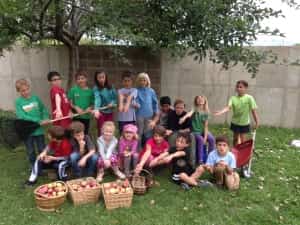By Darsa Morrow
You know what makes a really satisfying sound? An overripe apple smashing against a brick wall.
Many Mackintosh students discovered that sensation this fall as the school apple trees bore a bumper crop of fruit. And, as you might imagine, students hurling rotting fruit at the school building wasn’t exactly a recess activity that faculty celebrated.
Before the majority of the apples ripened, fell to the ground, and met their fate against the bricks, Katelyn Jackson, 1st grade teacher, gathered her students. They happened to be studying plants for their IB Unit of Inquiry, so this was a perfect opportunity to apply their learning. Standing between the loaded tree and the wall with remnants of smashed apples clinging to its bricks, Katelyn instigated the beginning of the IB Action Cycle with the “reflection” step.
The students noticed the apple tree, which is a plant. They discussed what they’d learned about the importance of plants in the health of people and the planet. They reviewed the parts of the plants and noted that apples are the part of an apple tree that can be eaten. They also noted that the tree had an abundance of ripe apples hanging from its branches.
The next step of the Action Cycle is “choosing.” The first graders decided they’d each like to pick an apple to take home to eat. They also decided that they wanted to make and eat applesauce at school. Katelyn then asked the students what should be done with the many apples that would still be left on the trees, even after they each had one and had made applesauce. One first-grader asked, “Could we share the apples? Maybe with some people who don’t have enough food?”
The last step of the cycle is “act.” Once the first graders were determined to use the apples for good, they enlisted the help of their 4th grade reading buddies to help them pick. The two grades joined forces on a beautiful fall day to harvest the fruit. The bounty of organic apples totaled almost 27 pounds.
The students then gathered once more to decide where they would donate the fruit. Should it go to a shelter for homeless adults? To a place that housed women and children in need? A first-grader said, “How about a place that would help everybody?” All the students agreed enthusiastically. Ultimately, they donated the fruit to the food bank at the Emergency Family Assistance Association in Boulder.
Every day at Mackintosh Academy, this action-learning cycle helps children reflect on ways they can contribute to the world around them. This month, it was apples. It is our goal that our students will continue the practice into adulthood, and that they will be able, in whatever situation, to move from reflection into new action that will benefit others and the world.
And, as a bonus, since the students came to realize the real value of the school fruit, apple smashing at recess became a lot less appealing.

